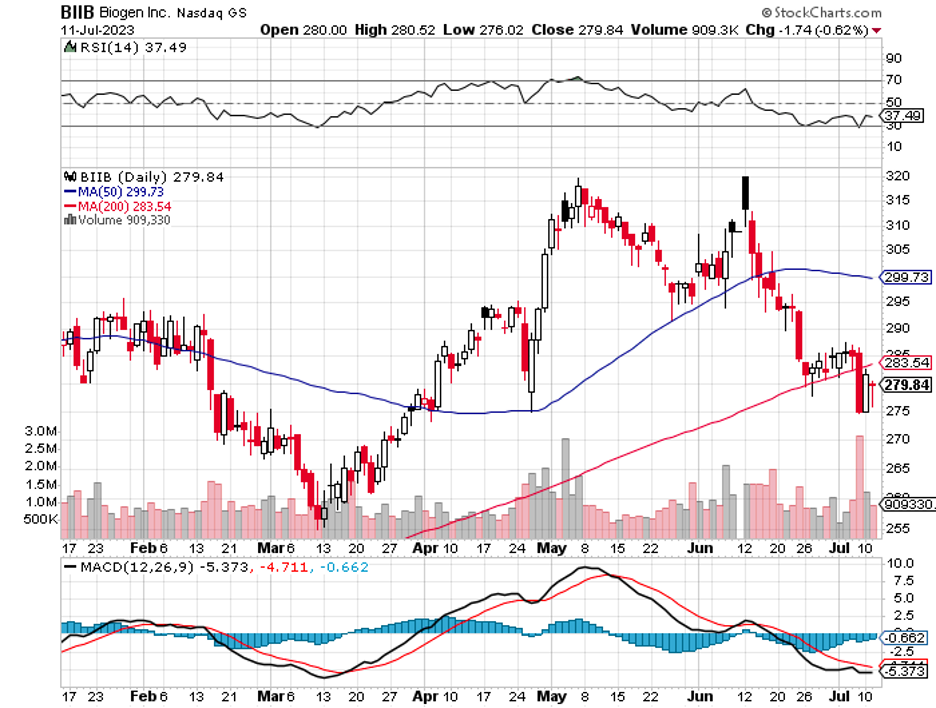A Rocky Road to Redemption
In an era marked by dynamic biotech developments, Biogen (BIIB) had once emerged as an industry powerhouse, the fruitful labor of its innovative multiple sclerosis drugs catapulting revenues into the stratosphere.
Unfortunately, time revealed a looming issue as the company's marquee products confronted diminishing exclusivity: stagnation.
Confronted by the precipice of change, Biogen made a strategic pivot toward the complex world of Alzheimer's disease. In partnership with the Japanese pharmaceutical giant Eisai (ESALY), they trailblazed the development of Leqembi, a game-changer that recently bagged the much-coveted traditional approval from the U.S. Food and Drug Administration (FDA).
The stamp of approval from federal authorities signifies a significant advancement towards broadening the drug's reach. Earlier in the year, the Centers for Medicare and Medicaid Services pledged to shoulder a considerable portion of the cost of Leqembi, contingent on the FDA's full authorization.
This commitment brings relief to aging American beneficiaries of Medicare, lightening the load of the drug's yearly $26,500 bill.
Armed with the FDA's endorsement and CMS agreeing to shoulder most of the expenses, there is anticipation that thousands, if not tens of thousands, of Alzheimer's patients across the US will be prescribed either lecanamab or donanemab in the imminent years.
But a question remains: Will this approval be sufficient to invigorate BIIB, a stock that has languished in the doldrums for the past decade?
Leqembi has been projected to become a blockbuster in a few years, with its total sales expected to exceed $12 billion from 2023 to 2028. Although Biogen and Eisai will be splitting the profits, Leqembi's potential as a significant asset for Biogen cannot be overlooked.
The imperative to treat Alzheimer's disease is grave, considering the current 6 million Americans living with the condition, a figure which could potentially burgeon to 13 million by 2050.
Disturbingly, this affliction claims more elderly lives than breast and prostate cancer combined.
In relation to this, the worldwide Alzheimer's therapeutics market is estimated to record a compound annual growth rate of 16.2% stretching into 2030, when it is anticipated to hit a worth of around $15.6 billion.
Eisai had earlier projected that Leqembi's peak sales could rake in a lucrative $7.3 billion by 2030. Meanwhile, experts believe the figure would be closer to $13 billion.
So, why didn't Biogen's shares experience a bounce on the back of this news?
They actually dipped by 3.5% in the trading session, and overall, the stock has remained relatively stable this 2023.
The answer lies in what happened last autumn when Biogen saw a nearly 40% surge in a single day when it announced Leqembi's successful achievement of clinical trial objectives. Given the positive data, investors largely anticipated an approval, suggesting that this recent positive update was already baked into the stock price.
What then about the future revenues?
Considering that Biogen isn’t exactly launching an “everyday pill,” there might be issues to resolve first.
Before commencing the treatment, patients would require PET scans or lumbar punctures for a confirmed diagnosis. Following this, Leqembi is to be administered at infusion centers -- a process that could potentially face capacity issues. These factors imply that rolling out Leqembi and getting all potential patients on the treatment might be a gradual process.
Biogen also anticipates that this year, the costs associated with bringing Leqembi to the market will eclipse the revenue it generates. As such, this novel product poses a short-term challenge and will likely dampen growth in 2023.
Should you then put money in Biogen stocks?
Answering this query isn't straightforward as it hinges on your risk appetite. It's possible that hurdles such as infusion center inadequacies can be overcome -- Biogen's vast experience places them in a strong position to address these.
However, the crux of the matter revolves around whether the medical community and patients will embrace the treatment, a point of uncertainty and risk.
For the thrill-seeking investor who embraces unpredictability, Biogen could offer an appealing opportunity at the moment.
If their new drug, Leqembi, attains success, the long-term potential for the stock's rise is significant.
For the more reserved investor, though, waiting for clearer signs of acceptance from doctors and patients might be a safer play. As for me, I suggest waiting and buying the dip.

